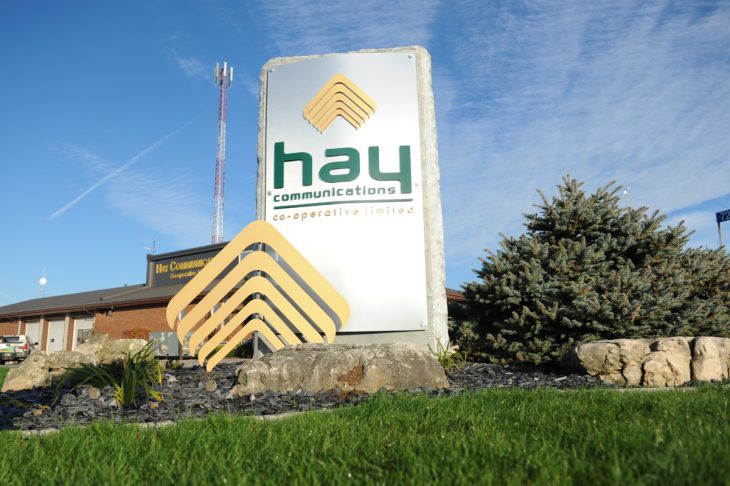
100 Mbps – up and down – is the goal for all customers
ZURICH, Ont. – Independent incumbent telecom provider Hay Communications has launched a new 100 Mbps basic internet package for $50 a month, boasting symmetrical speeds – meaning upload speeds are as fast as download (something normally not the case for most ISPs).
The service, powered by the 100-year-old company’s growing fibre network, also has no data caps. While not everyone in Hay’s rural southwestern Ontario service regions (Exeter, Zurich, Grand Bend, Dashwood, Hensall and areas in between), can get those speeds yet, “our goal is to give 100% of customers the ability to achieve up to 100 Mbps download speeds at an extremely affordable rate. We have been working and will continue to expand our fibre network to do just that,” said Angela Lawrence, general manager, in a press release Wednesday.
“We decided to open up the throttle you could say and let people use what they need,” she added.
While the 100 Mbps symmetrical is only available if a customer has a Hay fibre connection, the company is also increasing the upload available on its cable TV network to 10 Mbps, said the company.
Noting the CRTC’s new basic service objective now says all Canadians should have access to at least 50 Mbps download by 10 Mbps upload, “Hay is taking that further by doubling the download speed in their new standard Internet 100 package,” says the release.
When compared to those living in cities, small town residents and especially farm owners are often asked to accept slower speeds at higher rates from large service providers, but Hay sees this lower-cost, higher speed move as one which can boost its entire region.
“As a co-operative we see ourselves as an integral part of encouraging local economic development,” said Lawrence. “We believe the affordable rate of $50 a month evens the playing field for all income levels and makes starting a new business easier.”
Bundling discounts (Hay also offers home phone, wireless, television and home security) can provide a further discount of up to 15%.
The fibre network is not built out to everyone in its 525 square km footprint yet, but “over the last 15 years we have installed fibre to approximately 75% of roads and all towns have either been totally overbuilt with fibre, or are at least serviced with a connection to the main fibre ring,” said Kevin Gingerich, plant manager, in the release.
Construction priorities also include connections in their service area to South Huron Hospital, seven schools, three medical centres and numerous municipal government buildings.
“Unfortunately there are still several rural areas only serviced with copper wiring,” said Gingerich. “Realizing that approximately 80% or more of our territory is agricultural with some country blocks having only one or two farms on it, this is a costly and time-consuming endeavour. However, we will not stop expanding our network until we are finished the job and are confident we will have 100% fibre to each home and business.”


